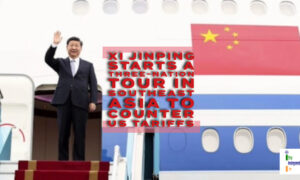
The anti-subsidy investigation will cover battery-powered cars from China, including non-Chinese brands made there, such as Tesla, Renault and BMW
The President of the European Commission – Ursula von der Leyen, has announced the launch of an anti-subsidy investigation into Electric Vehicles (EVs) coming from China over concerns that the payments are harming the European market
The anti-subsidy investigation covers battery-powered cars from China, including non-Chinese brands made there, such as Tesla, Renault and BMW. The European Commission will have up to 13 months to assess whether to impose tariffs above the standard 10% European Union (E.U.) rate for cars.
The probe is the highest-profile case against China since a European Union (E.U.) probe into Chinese solar panels, which narrowly avoided a trade war a decade ago.
Taking it to X (formerly Twitter), the European Commission tweeted,
"Global markets are now flooded with cheaper Chinese electric cars.
— European Commission (@EU_Commission) September 13, 2023
And their price is kept artificially low by huge state subsidies.
We are launching an anti-subsidy investigation into electric vehicles coming from China."
— President @vonderleyen #SOTEU 2023 pic.twitter.com/1xSiv3VzmM
Prior to this, France had raised concerns that Europe would fall behind during the green transition if it was not more assertive when confronted with China’s alleged protectionism. However, some E.U. Member States, including Germany, are wary of upsetting China as they rely on trade relations with China. Despite this, Germany welcomed the probe Wednesday. China’s leaders have helped make the country the biggest market for electric vehicles by investing billions of dollars in subsidies to get an early lead in what is seen as a promising industry.
Meanwhile, China blasted the launch of the probe as protectionist and warned it would negatively impact economic and trade relations.
A Statement from the Ministry of Commerce, China read, “The investigation is a naked protectionist act that will seriously disrupt and distort the global automotive industry and supply chain, including the EU, and will have a negative impact on China-EU economic and trade relations.”
It further read, “China will pay close attention to the EU’s protectionist tendencies and follow-up actions, and firmly safeguard the legitimate rights and interests of Chinese companies.”
The probe, which could result in punitive tariffs, has prompted analyst warnings of retaliatory action from China as well as pushback from Chinese industry executives who believe that the sector’s competitive advantage was not due to subsidies.
Besides, global automakers are facing growing competition in their home regions from Chinese brands that are taking market share. EV makers BYD Auto and Geely Group’s Zeekr unit began sales this year in Japan and Europe, respectively. Geely also owns Sweden’s Volvo Cars and its all-electric luxury brand – Polestar. Ursula said that while Europe is open to competition, it is “not for a race to the bottom.”
Relations between E.U. and China have grown tense due to China’s closeness to Russia, in the wake of the Russian invasion of Ukraine. Also, the E.U. has been pushing to rely less of China. During the recently concluded G20 Summit in India, Chinese Premier – Li Qiang urged Ursula to provide a non-discriminatory environment for Chinese firms and urged stability in Sino-E.U. relations as a hedge against global uncertainties.
The E.U. believes that Chinese EVs are undercutting the prices of local models by about 20% in the European market, piling pressure on European automakers to produce lower-cost electric vehicles. China’s share of EVs sold in Europe has increased to 8% and could reach 15% in 2025.
As per the United States (U.S.) based think tank – Center for Strategic and Internal Studies (CSIS), in 2022, 35% of all exported electric cars originated from China, 10 percentage points higher than the previous year.







